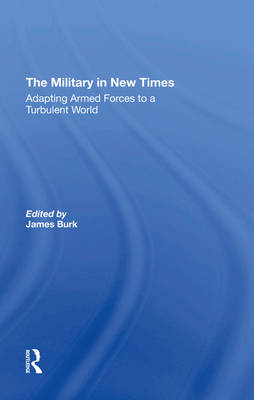
- Retrait gratuit dans votre magasin Club
- 7.000.000 titres dans notre catalogue
- Payer en toute sécurité
- Toujours un magasin près de chez vous
- Retrait gratuit dans votre magasin Club
- 7.000.0000 titres dans notre catalogue
- Payer en toute sécurité
- Toujours un magasin près de chez vous
The Military in New Times
Adapting Armed Forces to a Turbulent World
James Burk, Robert J Waldman, David R Segal, Charles C Moskos
Livre relié | Anglais
195,95 €
+ 391 points
Description
What role will armed forces play in a world that is turbulent yet no longer organized by the bipolar conflict of East and West? In this volume, leading experts from several disciplines assess the rapidly changing global strategic and cultural landscape, examining how it will affect the responsibilities and social standing of the modern military. There are provocative disagreements among the contributors, especially over whether we should expect and prepare for another global war. However, the contributors generally agree on several broad themes that guide their analysis. Arguing that the Cold War has masked basic trends that have been reshaping the international system for a long time, they suggest that the sovereign states' dominance of the international system is rapidly coming to an end, as multinational, ethnic, regional, and religious groups-to name a few-increasingly affect the course of global affairs. In the absence of a clear "enemy," the military faces an identity crisis. In the postmodern atmosphere of this multicentric global order, authority is fragmented, and the exercise of any one authority is subject to greater scrutiny and challenge. The military has become more accepting of a variety of values, life-styles, and attitudes toward its tasks. At the same time, support for the military's mission is difficult to win, requiring endless justification. The authors believe that the principal missions for the military in these new times are peacekeeping, peacemaking, and humanitarian assistance. They examine the prospects for successful operations in these areas, taking into account the cultural lag between world structures that favor increased multinational peacekeeping forces and individual nations that supply token resources to support such efforts. This volume provides a sophisticated and thought-provoking perspective on the future role of the military in the coming decades. It is sure to enrich the vigorous debate surrounding these issues.
Spécifications
Parties prenantes
- Auteur(s) :
- Editeur:
Contenu
- Nombre de pages :
- 213
- Langue:
- Anglais
Caractéristiques
- EAN:
- 9780367294069
- Date de parution :
- 07-05-19
- Format:
- Livre relié
- Format numérique:
- Genaaid
- Dimensions :
- 150 mm x 236 mm
- Poids :
- 453 g

Les avis
Nous publions uniquement les avis qui respectent les conditions requises. Consultez nos conditions pour les avis.






